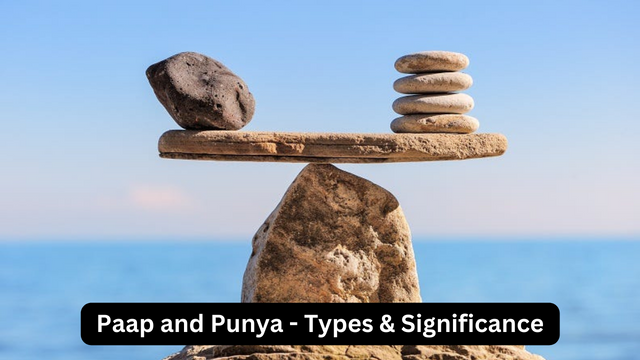Paap and Punya – Types & Significance

Upanishads are the short form for the Hindu scriptures Vedas and Geeta is a short form of Upanishads. Smriti explains the system and knowledge-related things of the above three respectively and clearly. Purana, Ramayana, and Mahabharata are the ancient history of Hindus and not only religious scriptures. Scholars say that life should be molded according to the scriptures. Presented here are ten major Punya (Virtues) and ten major Paap (Sins) according to the scriptures. By knowing these and implementing them, any person can bring revolutionary changes in life.
The concepts of sin and virtue are important in Hinduism and following them strengthens one’s connection with the soul and with God. By thinking about the consequences of sin and virtue, a person’s conduct moves towards higher standards in society, and social morality is followed.

Fruits of Paap : Injustice and Suffering
Sinful actions result in injustice and suffering. Here lies, theft, violence, disregard for religion, etc. come into play. If a person indulges in unrighteous actions, his sinful deeds can put him in an unhappy state and his soul feels a lack of self-confidence.
Fruits of Punya : Righteousness and Joy
The result of virtuous deeds is righteousness and happiness. This is achieved by the conduct of truth, kindness, charity, penance, service, etc. If the person is engaged in religious activities, their soul feels peace, satisfaction, and joy.
Karma and Hell-Heaven : Awareness and Efforts
In Hindu religion, there is a belief in karma, hell, and heaven, but its main objective is to help a person attain the highest soul and God. If a person follows unrighteous actions, his sinful karma can take him to hell where he suffers sorrow and suffering. From there his soul has to do proper atonement for salvation. On the contrary, the virtuous deeds of the follower of religious activities take him to heaven where he enjoys happiness and joy.
The concepts of sin and virtue are one of the core principles of Hinduism, encouraging one to move towards higher standards. It encourages sensitivity towards one’s soul, social morality, and spiritual development. The subject of sin and virtue has been discussed in detail in the Vedas, Dharmashastras, and Puranas. Recognition of sin and virtue is an important part of Indian religious elements and it guides the society towards morality, righteousness, and walking on the highest path.

Definition and types of Paap
Sin means those actions or conduct which are against religious and moral standards. Examples of sins can be various types of unrighteous actions such as untruth, theft, violence, injustice, impurity, etc.
Definition and types of Punya
Virtue means those actions or conducts that are by religious and moral standards and serve towards social progress, morality, and spiritual progress. Examples of virtue can be good deeds, non-violence, truth, charity, penance, meditation, service, etc.
Effect of sin and virtue
In Indian religions, it is believed that the karmic consequences of sins and virtues affect life, and this can happen through both worldly and spiritual means. If a person takes more actions towards sins, then sorrow and suffering may come in his life. On the contrary, virtuous actions lead to happiness, peace, and prosperity in life.
Importance of morality and religion
The recognition of sin and virtue in Indian religions aims to guide morality, righteousness, and spiritual progress. It inspires society to follow the proper path and becomes a part of the social and spiritual progress of society.
Thus, the recognition of sin and virtue guides morality, religiosity, spirituality, and social development in Indian religions. It helps a person to attain the highest human qualities and guides him to attain true happiness and joy.

Ten Major Punya
- Dhriti – To maintain patience in every situation.
- Kshama – Do not take revenge, do not get angry even if there is a reason for anger.
- Dum- Not being unruly.
- Asteya- Do not think of grabbing someone else’s thing.
- Shoch- purity of diet. Purity of the body.
- Indriyanigraha – Do not allow the senses to indulge in objects (desires).
- Dhee – To understand something very well.
- Vidya – Knowledge of Dharma, Artha, Kama and Moksha.
- Satya- Do not speak lies and harmful words.
- Akrodh- Do not get angry even if someone insults you after forgiveness.
Ten Major Paap
- Desire to grab the wealth of others.
- Attempt to perform prohibited acts (those which the mind forbids doing).
- Considering the body as everything.
- Speaking harsh words.
- Lying.
- To condemn.
- Nonsense, talking without any reason.
- Stealing.
- To hurt someone through body, mind, and actions.
- Having relations with another man or woman.